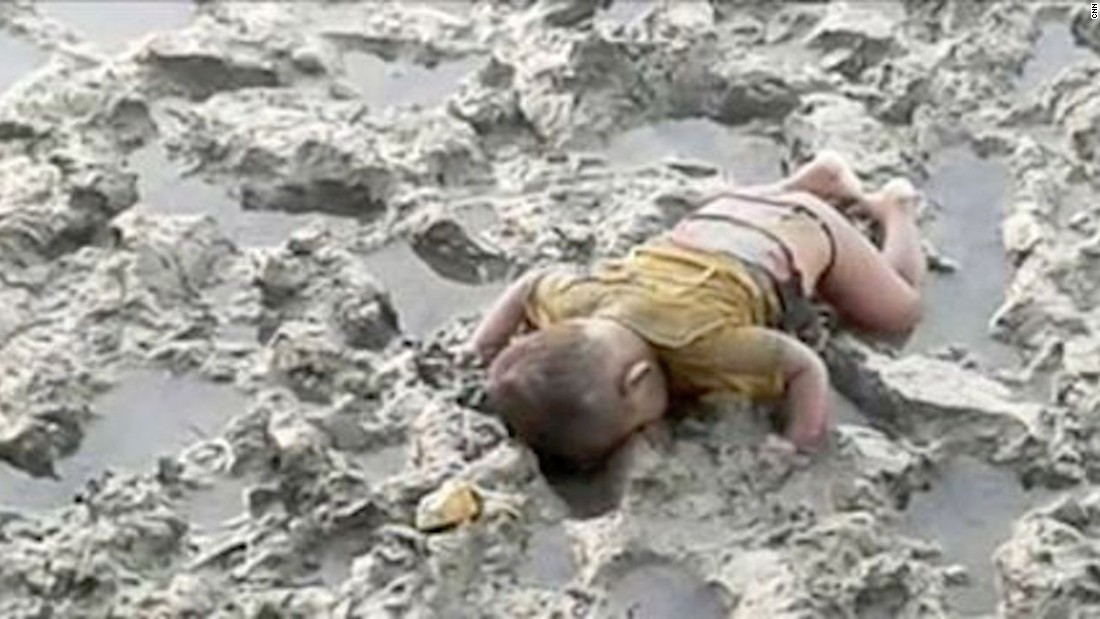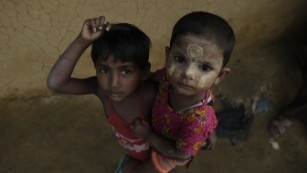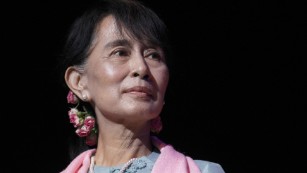'The Rohingya Alan Kurdi': Will the world take notice now?
Face down in the mud, a baby boy lies still after washing up on a river bank.
His name is Mohammed Shohayet, a 16-month-old Rohingya refugee whose family fled their home for Bangladesh to escape the violence in Myanmar's Rakhine State, only to drown during the journey along with his mother, uncle and three-year-old brother.
"When I see the picture, I feel like I would rather die," Mohammed's father, Zafor Alam, told CNN. "There is no point in me living in this world."
The image has parallels with that of the young Syrian refugee Alan Kurdi, who was found dead on a Turkish beach in September 2015, after trying to flee the civil war at home.
The conflicts the two boys left behind are different, but the desperation of their families to escape is all too familiar.
Myanmar's Muslim Rohingyas are considered one of the world's most persecuted minorities. The Myanmar government views them as Bengali immigrants, despite the fact that they've lived for generations in Myanmar's Rakhine State.
"In our village, helicopters fired guns at us, and the Myanmar soldiers also opened fire on us," said Alam. "We couldn't stay in our house. We fled and went into hiding in the jungle."
"My grandfather and grandmother were burnt to death," he added. "Our whole village was burnt by the military. Nothing left."
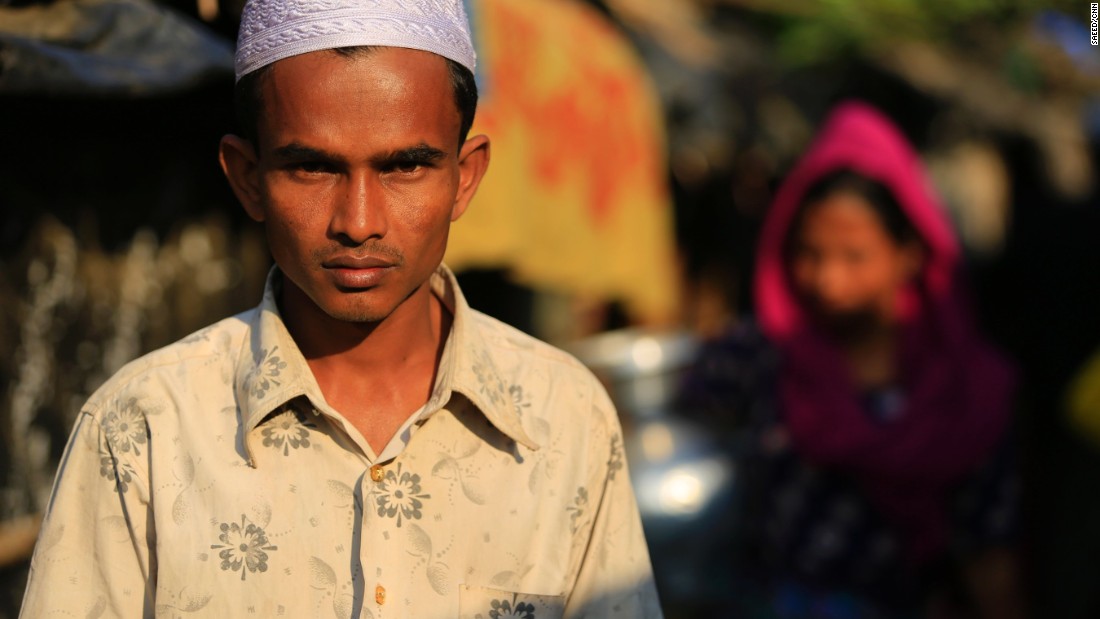
Zafor Alam inside the Leda camp, Teknaf, Bangladesh.
'The military was searching for Rohingyas'
Zafor Alam said they ran from village to village trying to escape the violence.
Who are the Rohingya?
- The Rohingya are a stateless Muslim minority in Myanmar's Rakhine state thought to number about one million people
- Myanmar does not recognize them as citizens or one of the 135 recognized ethnic groups living in the country
- Much of this is rooted in their heritage in East Bengal, now called Bangladesh
- Though many Rohingya have only known life in Myanmar, they are widely viewed as intruders from across the border
- According to Human Rights Watch, laws discriminate against the Rohingya, infringing on their freedom of movement, education, and employment
- They are denied land and property rights and ownership, and land on which they live can be taken away at any given time
"I walked for six days. I couldn't eat rice for four days. I could not sleep at all for six days," he said. "We constantly changed our location as the military was searching for Rohingyas."
Alam became separated from his family during the journey and made it to the Naf River which runs between Myanmar and Bangladesh. He says he began swimming and was picked up by Bangladeshi fishermen who took him across the border.
Then, he says he started the process to get his family across to safety.
"I contacted a boatman and asked him to help my wife and sons so that they could cross the river. They were waiting on the other side," Alam said.
"I called (my family) on December 4. They were very desperate to leave Myanmar," Alam said. "They were the last words I had with my family. When I was talking to my wife over phone, I could hear my youngest son calling 'Abba-Abba' (father-father)."
Just a few hours after that phone call, Alam said his family tried to make their escape.
"When the Myanmar police got a sense that people were preparing to cross the river, they opened fire," Alam said. "Hurriedly, the boatman took all people on board to escape the firing. The boat became overloaded. Then it sank."
A day later, on December 5, he learned what happened.
"Someone phoned me and said my son's dead body was found," Alam said. "He took a photo of my son by mobile phone and sent it to me. I was speechless."
"It's very difficult for me to talk about my son. He was very fond of his father," he added. "My son was very affectionate. In our village, everyone used to love him."
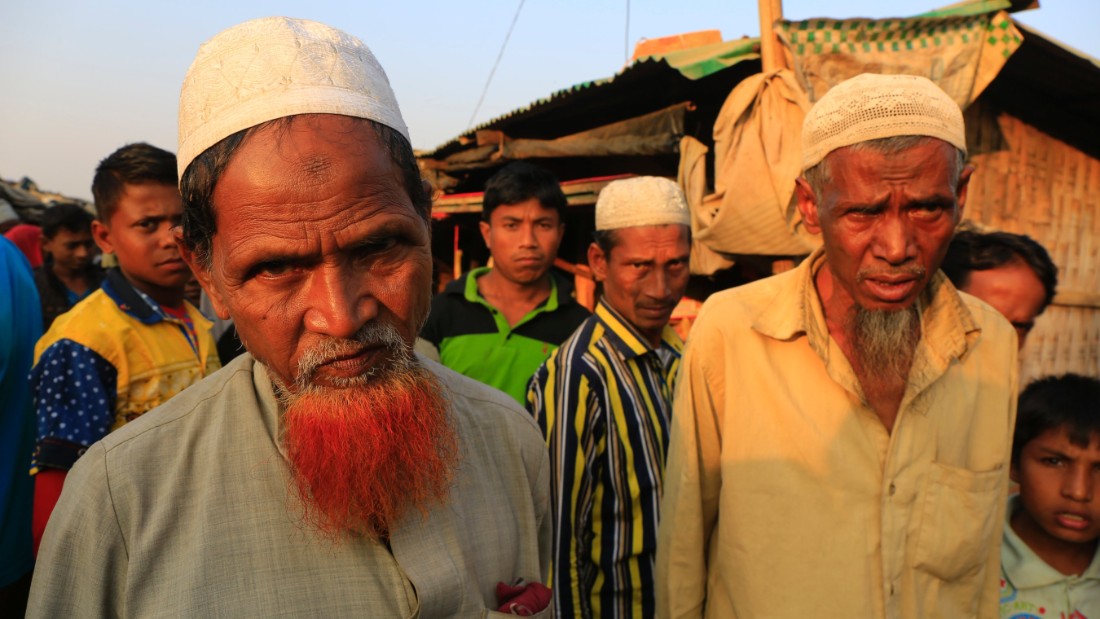
Rohingya men inside the Rohingya camp, Teknaf, Bangladesh.
'Only the river knows'
Alam's story of his family being torn apart trying to escape is one familiar to many Rohingya families who have made it across the border to Bangladesh. The International Organization for Migration says some 34,000 people have crossed the border in recent weeks and months.
"Only the river knows how many dead bodies of Rohingyas are floating there," Alam said.
Now at the Leda refugee camp in Teknaf, southern Bangladesh, Alam is struggling to come to terms with what happened.
"I have no one left. My two sons and my wife died. All are finished," he said.
"We are also suffering here in Bangladesh. There is no house here to live in. There is no food. People who have been living in the camp for a long time, they have given us shelter."
But at least, it's a respite from the violence.
"We used to live in constant fear of losing our lives in Myanmar," he said. "We don't have any fear in Bangladesh."
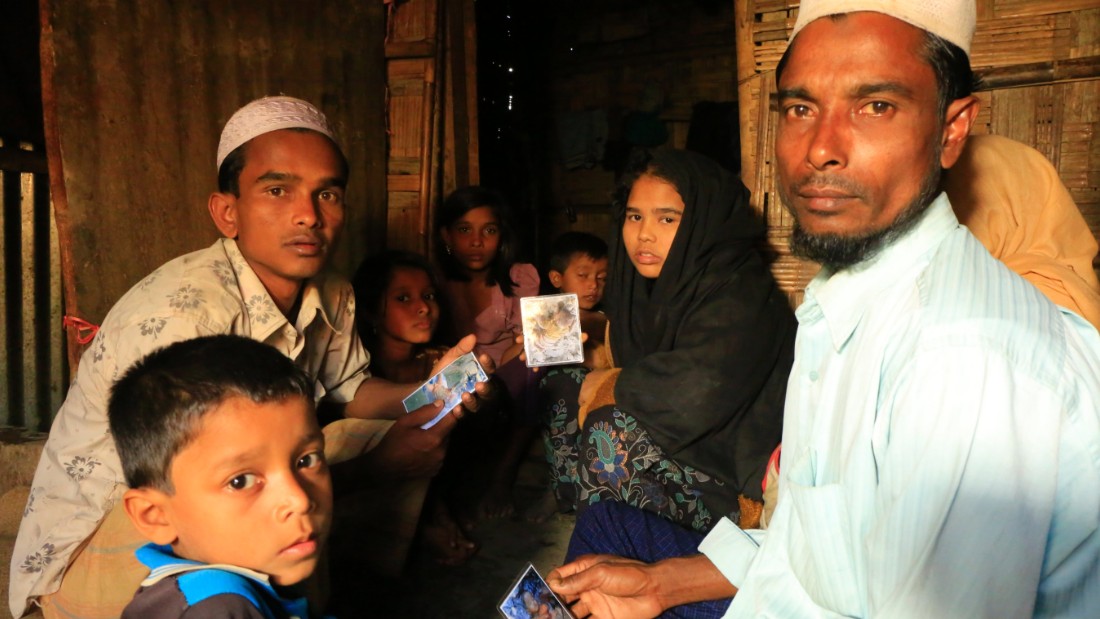
Zafor Alam's 18-year-old sister and 14-year-old brother are both with him in the camp in Bangladesh.
CNN is unable to independently verify Zafor Alam's account, as access to northern Rakhine State is still heavily restricted.
In a written response to CNN, Aye Aye Soe, Myanmar government spokesperson, called the testimony "propaganda" and "false."
She did confirm that Myanmar military helicopters fired on a Rohingya village on November 12, but said this was a rescue mission aimed at dispersing an "armed mob of suspected perpetrators and collaborating villagers" who ambushed Myanmar troops.
The Myanmar government has repeatedly denied claims of human rights abuses, saying they are only carrying out "clearance operations" against suspects involved in an attack on Myanmar border guards on October 9.
This week, the government made a rare announcement that it would investigate police brutality after a video emerged showing officers beating Rohingya villagers.
'Nothing has changed'
In September, the government set up the Rakhine Commission, led by Kofi Annan, to look into problems in the region.
Zafor Alam said that the commission is a smokescreen.
Myanmar: Rohingya refugees flee torture and rape
"The commission has been formed to deceive the whole world," he said. "The military drives people out of the villages when the commission visits the area."
"When the elections took place in Myanmar, I thought as Aung San Suu Kyi won, it would be beneficial for us," Alam said. "But the dream and the reality is completely different. Since she assumed power, nothing has changed. We are still being persecuted."
"Aung San Suu Kyi and the military want to eliminate Rohingyas from Rakhine State. She is denying the atrocities committed by the military," he said.
Amnesty International has released a lengthy report which says the "systematic campaign of violence" against the Rohingya people "may amount to crimes against humanity." Aye Aye Soe told CNN these claims are "unsubstantiated."
Myanmar state counselor Aung San Suu Kyi held a meeting with foreign ministers from the Association of Southeast Asian Nations (ASEAN) in Yangon this month to discuss the situation.
Rohingya crackdown: Myanmar's Aung San Suu Kyi accused of ignoring minority Muslims
Aung San Suu Kyi told the ministers that the government is committed to resolving the issues in Rakhine State, but said that "time and space are critical for the efforts to bear fruit," according to state newspaper The Global New Light of Myanmar.
But Zafor Alam said allowing the government more "time and space" will only end in more bloodshed.
"I want to let the whole world know," he said. "The Myanmar government should not be given any more time.
If you take time to take action, they will kill all Rohingyas."
News Courtesy: www.cnn.com

